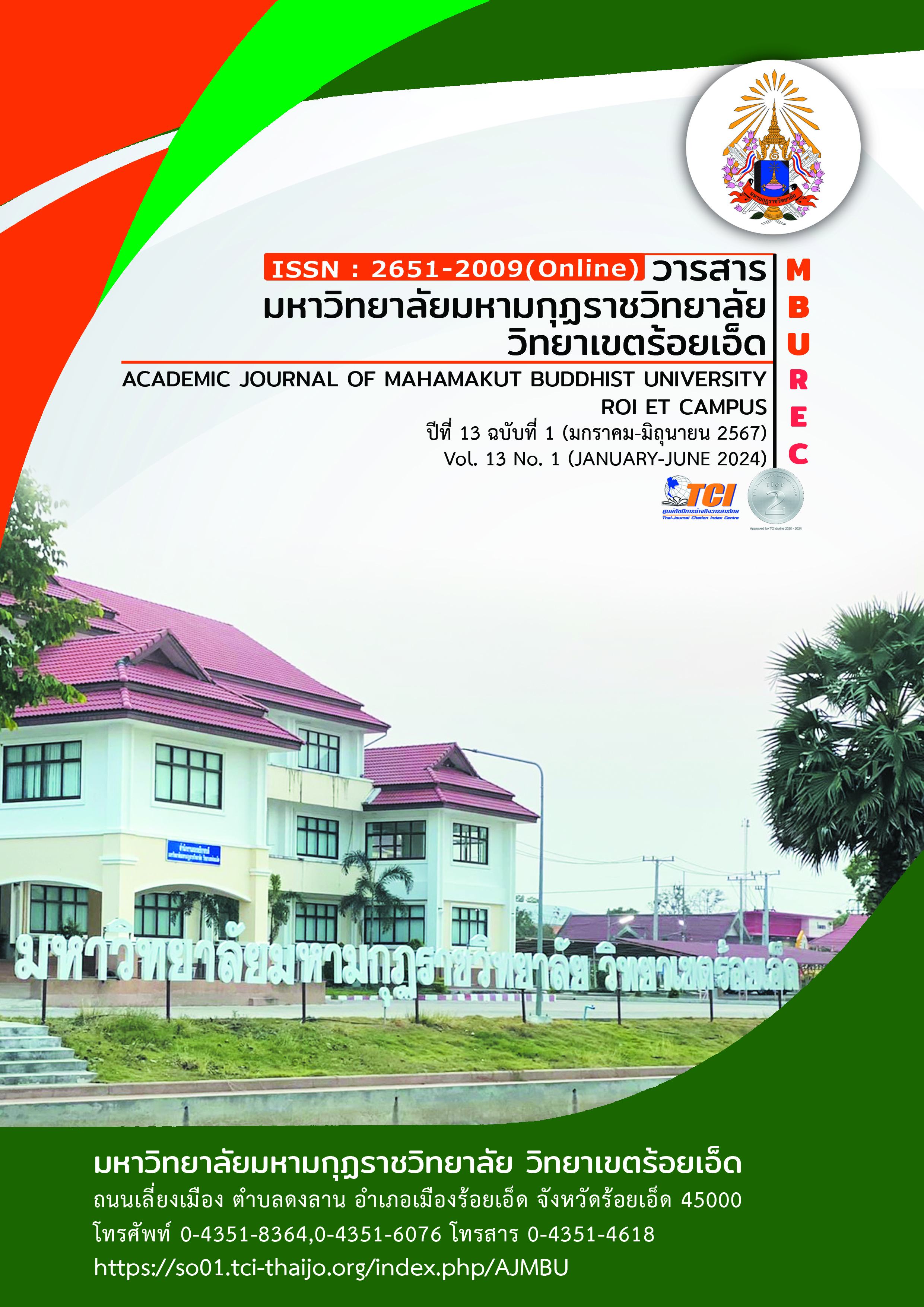EMOTIONAL MATURITY OF SCHOOL ADMINISTRATORS AS PERCEIVED BY TEACHERS UNDER PATHUM THANI SECONDARY EDUCATIONAL SERVICE AREA OFFICE
Main Article Content
Abstract
The purposes of this research were 1) to study Emotional Maturity of School Administrators As Perceived by Teachers Under Pathum Thani Secondary Educational Service Area Office, and 2) to compare the Emotional Maturity of School Administrators as Perceived by Teachers Under Pathum Thani Secondary Educational Service Area Office as classified by academic degree, work experience and school size. The research sample is teachers under Pathum Thani Secondary Educational Service Area Office in the academic year 2023. The sample was determined by using Cohen’s table of 322 teachers Under Pathum Thani Secondary Educational Service Area Office, through stratified random sampling, simple random sampling, and comparative proportions by school sizes. The instrument was a questionnaire querying teachers’ opinions about Emotional Maturity of School Administrators as Perceived by Teachers Under Pathum Thani Secondary Educational Service Area Office. The questionnaire was found to be couched at a reliability level of 1.00. The statistics used in the data analysis were mean, standard deviation, t-test, One-way ANOVA, and Scheffe's multiple comparison method.
The research findings were as follow: 1. Results of the study of emotional maturity of school administrators according to the perception of teachers under the Pathum Thani Secondary Educational Service Area Office Overall and each aspect at a high level 2. Emotional maturity comparison results of educational institution administrators according to the perception of teachers under the Pathum Thani Secondary Educational Service Area Office. It was found that teachers with different educational levels. Have an opinion on emotional maturity of school administrators according to the perception of teachers under the Pathum Thani Secondary Educational Service Area Office Overall, there is no difference. Teachers with different working experiences. Have an opinion on emotional maturity of school administrators according to the perception of teachers under the Pathum Thani Secondary Educational Service Area Office Overall and individually, these include self-awareness. The difference is statistically significant at 0.05 and teachers belong to different educational institution sizes. Have an opinion on emotional maturity of school administrators according to the perception of teachers under the Pathum Thani Secondary Educational Service Area Office Overall and individually, these include self-awareness. Statistically significant difference 0.05.
Article Details

This work is licensed under a Creative Commons Attribution-NonCommercial-NoDerivatives 4.0 International License.
References
กนกพร โพธิ์มณี. (2562). การศึกษาความฉลาดทางอารมณ์ของผู้บริหาร สังกัดสำนักงานเขตพื้นที่การศึกษาประถมศึกษาจันทบุรี. วิทยานิพนธ์ครุศาสตรมหาบัณฑิต สาขาวิชาการบริหารการศึกษา. บัณฑิตวิทยาลัย : มหาวิทยาลัยราชภัฏรำไพพรรณี.
เกรียงศักดิ์ เจริญวงศักดิ์. (2554). การคิดเชิงสังเคราะห์. พิมพ์ครั้งที่ 4. กรุงเทพมหานคร : บริษัท ซัคเซส มีเดีย.
ธัญญารัตน์ ทับทิม. (2557). ความฉลาดทางอารมณ์ของผู้บริหารสถานศึกษาและครูสังกัดสํานักงานเขตพื้นที่การศึกษาประถมศึกษาสิงห์บุรี. วิทยานิพนธ์ครุศาสตรมหาบัณฑิต สาขาวิชาการบริหารการศึกษา. บัณฑิตวิทยาลัย : มหาวิทยาลัยราชภัฏเทพสตรี.
ปวีณา บุศยรัตน. (2565). ความฉลาดทางอารมณ์ของผู้บริหารสถานศึกษาตามการรับรู้ของครูผู้สอนสังกัดสำนักงานเขตพื้นที่การศึกษาประถมศึกษาตราด. วิทยานิพนธ์ครุศาสตร มหาบัณฑิต สาขาวิชาการบริหารการศึกษา. บัณฑิตวิทยาลัย : มหาวิทยาลัยราชภัฏรำไพพรรณี.
ไพศาล วรคำ. (2561). การวิจัยทางการศึกษา. มหาสารคาม : ตักสิลาการพิมพ์.
สุรีย์พร รุ่งกําจัด. (2556). ความฉลาดทางอารมณ์ของผู้บริหารสถานศึกษากับการดําเนินงานด้านบุคคลของสถานศึกษา อำเภอองครักษ์ สังกัดสำนักงานเขตพื้นที่การศึกษาประถมศึกษานครนายก. วิทยานิพนธ์ศึกษาศาสตรมหาบัณฑิต สาขาวิชาเทคโนโลยีการบริหารการศึกษา. บัณฑิตวิทยาลัย : มหาวิทยาลัยเทคโนโลยีราชมงคลธัญบุรี.
Goleman, D. (1998). Working with Emotional Intelligence. New York : Bantam Book.


